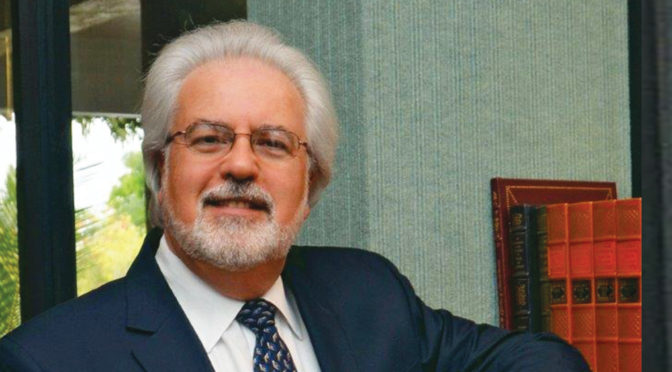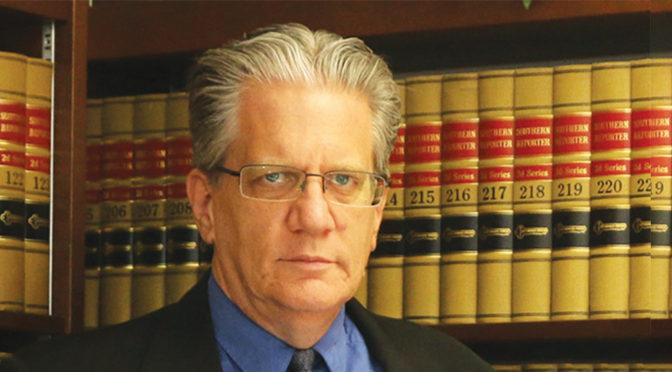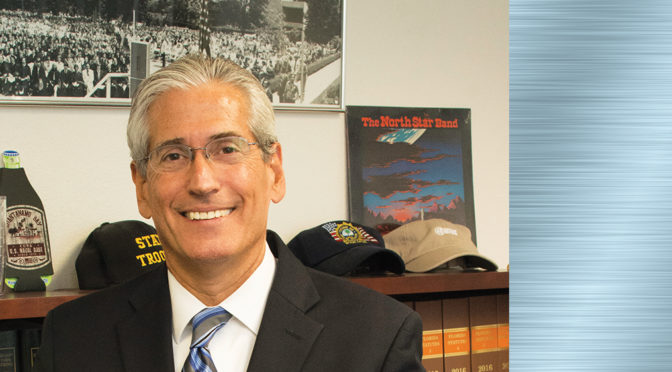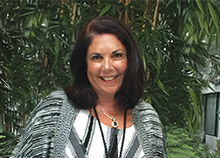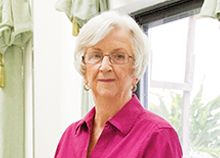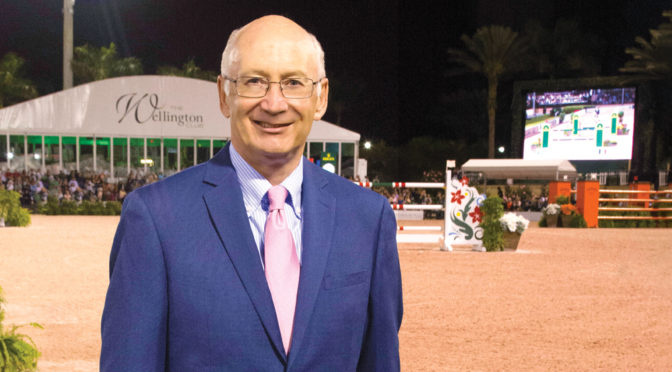From Music To Fighting The Opioid Scourge: The Many Facets Of Chief Assistant State Attorney Alan Johnson
When he is playing in the band Americana Jones, Wellington resident Alan Johnson dons a hat and boots. Most days, though, he wears a suit to the office, where he is the Chief Assistant State Attorney of Palm Beach County.
One of three chief assistants to State Attorney Dave Aronberg, Johnson manages what would be the largest law firm in the county. When he is playing in the band Americana Jones, Wellington resident Alan Johnson dons a hat and boots. Most days, though, he wears a suit to the office, where he is the Chief Assistant State Attorney of Palm Beach County.
One of three chief assistants to State Attorney Dave Aronberg, Johnson manages what would be the largest law firm in the county. He first joined the State Attorney’s Office in 1993 when he worked under former State Attorney Barry Krischer. He left after almost 17 years when Krischer retired. Johnson spent the next several years as executive director of the Palm Beach County Commission on Ethics. He returned to the State Attorney’s Office in 2013 when Aronberg took over as the county’s top prosecutor.
Johnson’s resume is impressive, including serving as a member and then chairman of the Unlicensed Practice of Law Committee; and at the Prosecuting Attorney’s Association in areas including prosecutors, evidence, homicide prosecution, jury selection and victim rights. For more than 20 years, he has also regularly served as a volunteer judge for youth court. Other community service runs the gamut from legal organizations to little league coach.
When not working or pursuing his musical hobby, Johnson enjoys swimming and riding his bike through his long-since-adopted hometown. In fact, the community pool is one of the things he likes best about Wellington.
“It is a lovely community, and it has a great swimming pool that needs to be open on Sunday,” he said. “I swim there all the time. I’m friendly with all the guards. They have a great crew out there and a great facility, as I say, it just needs to be open on Sunday.”
When Johnson moved to South Florida, he checked out Wellington at the suggestion of a law school friend, Judge Peter Evans. “One of my best friends suggested Wellington,” he said. “It was, and is, a great family community. I raised two children in the village.”
While his children are now grown and have moved away, Johnson stays active in the community.
“While I don’t wear my religion on my sleeve, I am on the board of directors at Temple B’nai Jacob in Wellington,” Johnson said. “I am a gabbai, which is kind of like an alderman or deacon. We help with the officiating of the service.”
In Wellington, Johnson served as a member of the village’s Planning, Zoning & Adjustment Board from 2000 to 2010, during some of the village’s boom years. “I’ve seen a lot of growth. We were annexing parcels of land along State Road 7,” he recalled, remarking that there have many improvements over the years. “The roads don’t flood quite as often.”
There have also been challenges with that growth. “I’ve seen the neighbor versus neighbor issues develop, the equestrian versus residential, and then the equestrian versus equestrian,” he recalled. “I live in the area of South Shore, so I’m right near the equestrian preserve.”
Now at the pinnacle of his profession, the law was not really his first career choice, although he made excellent preparations for it.
A graduate from Columbia University in 1973 and the Georgetown University Law Center in 1976, Johnson is also reported to have spent 16 years on the road in the 1970s and 1980s with the North Star Band and the Pheromones, releasing eight albums, before he devoted his primary energies to his daytime gig as a lawyer.
“I could have been a contender,” said Johnson with a laugh. “I don’t know how big a part of my life music has been; our band performs an average of about three or four times a month around South Florida.”
Palm Beach County is much better off that Johnson’s primary career ended up being in the law, not music.
Today, he supervises the departments of training, ethics, legal affairs, juvenile and investigation units; a support staff of 220 for the 120 attorneys in the office. He also presents training seminar courses on the ethics of discovery.
It has been mandated that every attorney take training on discovery or exculpatory evidence, also called Brady evidence, before they practice in circuit court. “I was tapped to give the presentations,” said Johnson, who added that a recording of the two-hour course is on the Florida Bar web site. “So, I took some teasing from peers about that.”
Johnson also chairs the Sober Homes Task Force, which includes the Criminal Law Enforcement Task Force and the Civilian Task Force. This effort is charged with combating the opioid crisis and abuses at uncertified recovery residences and drug treatment centers. Both task forces meet once a month to develop recommendations on how to fix this community scourge.
The serious side of Johnson’s personality comes out when he discusses the opioid epidemic. “I give community talks for the office to different groups about this problem and what people in the community can do,” he said. “Opioid addiction is the health crisis of our time.”
Two years ago, the department received some funding for this issue and Aronberg asked Johnson to handle the Sober Homes Task Force. However, that was just the start
“We were responsible for the legislation that passed last spring,” Johnson said. “I think it has made us one of the most innovative and forward-thinking states in the United States.”
As a matter of fact, other states, such as Texas and California, have begun to emulate Florida’s program. “Folks from Orange County, Calif., will be observing our next monthly task force meeting to see how we do things,” Johnson said.
South Florida is the location of many vibrant communities, destination cities with amenities and a tradition of tourism. Such places have a long history in the addiction treatment industry. This, combined with the misuse of well-intentioned laws such as the Affordable Care Act and the Americans with Disabilities Act, created a perfect storm for the opioid crisis.
“Opioid addiction is a disease, substance abuse disorder, and is a fact of life. The demographic most affected is young people, still on their parent’s insurance, who have come to our state for substance abuse treatment,” Johnson explained.
Here they exhaust their benefits and sometimes become the victims of unscrupulous bad actors who promote them into a cycle of relapse, with sometimes bogus treatment in rogue sober houses, instead of a cycle of recovery in facilities certified to national standards.
Johnson is quick to differentiate between the legitimate part of the industry and those rogue elements.
“There are good providers in the industry, and they are getting killed by all the bad actors causing all the bad press,” he said. “The good ones, most of the time you don’t even know they are there. They have good neighbor policies. The physical appearance of the house is usually better than most of the homeowners on the block.”
The bad ones, however, are more flop houses and not really sober houses.
“Those are the ones that drive neighborhoods crazy,” Johnson said. “There is drug use, no one overseeing the house, criminal activity. Residents can report such a house to our office or the Palm Beach County Sheriff’s Office. They have a very professional and knowledgeable crew that is trained to deal with it safely.”
The Palm Beach County State Attorney’s Office has worked to get laws on the books that prohibit kickbacks for referrals to treatment facilities. “We are turning on the lights, and the bad actors are scurrying to other jurisdictions,” Johnson said. “We are working to reward outcomes instead of just paying a fee for services.”
Johnson is very proud of the office’s work fighting this scourge.
“It is such a thorny issue that has touched almost every home,” Johnson said. “It is a true everyman epidemic. I give kudos to Dave Aronberg for the program he has set up. It is the only one of its kind in the country.”
Johnson said that the office’s work on opioids is a huge team effort that takes a tremendous amount of work, “It takes up a lot of time. I can’t swim as much as I used to,” he remarked, although he does have some time on Sundays.He first joined the State Attorney’s Office in 1993 when he worked under former State Attorney Barry Krischer. He left after almost 17 years when Krischer retired. Johnson spent the next several years as executive director of the Palm Beach County Commission on Ethics. He returned to the State Attorney’s Office in 2013 when Aronberg took over as the county’s top prosecutor.
Johnson’s resume is impressive, including serving as a member and then chairman of the Unlicensed Practice of Law Committee; and at the Prosecuting Attorney’s Association in areas including prosecutors, evidence, homicide prosecution, jury selection and victim rights. For more than 20 years, he has also regularly served as a volunteer judge for youth court. Other community service runs the gamut from legal organizations to little league coach.
When not working or pursuing his musical hobby, Johnson enjoys swimming and riding his bike through his long-since-adopted hometown. In fact, the community pool is one of the things he likes best about Wellington.
“It is a lovely community, and it has a great swimming pool that needs to be open on Sunday,” he said. “I swim there all the time. I’m friendly with all the guards. They have a great crew out there and a great facility, as I say, it just needs to be open on Sunday.”
When Johnson moved to South Florida, he checked out Wellington at the suggestion of a law school friend, Judge Peter Evans. “One of my best friends suggested Wellington,” he said. “It was, and is, a great family community. I raised two children in the village.”
While his children are now grown and have moved away, Johnson stays active in the community.
“While I don’t wear my religion on my sleeve, I am on the board of directors at Temple B’nai Jacob in Wellington,” Johnson said. “I am a gabbai, which is kind of like an alderman or deacon. We help with the officiating of the service.”
In Wellington, Johnson served as a member of the village’s Planning, Zoning & Adjustment Board from 2000 to 2010, during some of the village’s boom years. “I’ve seen a lot of growth. We were annexing parcels of land along State Road 7,” he recalled, remarking that there have many improvements over the years. “The roads don’t flood quite as often.”
There have also been challenges with that growth. “I’ve seen the neighbor versus neighbor issues develop, the equestrian versus residential, and then the equestrian versus equestrian,” he recalled. “I live in the area of South Shore, so I’m right near the equestrian preserve.”
Now at the pinnacle of his profession, the law was not really his first career choice, although he made excellent preparations for it.
A graduate from Columbia University in 1973 and the Georgetown University Law Center in 1976, Johnson is also reported to have spent 16 years on the road in the 1970s and 1980s with the North Star Band and the Pheromones, releasing eight albums, before he devoted his primary energies to his daytime gig as a lawyer.
“I could have been a contender,” said Johnson with a laugh. “I don’t know how big a part of my life music has been; our band performs an average of about three or four times a month around South Florida.”
Palm Beach County is much better off that Johnson’s primary career ended up being in the law, not music.
Today, he supervises the departments of training, ethics, legal affairs, juvenile and investigation units; a support staff of 220 for the 120 attorneys in the office. He also presents training seminar courses on the ethics of discovery.
It has been mandated that every attorney take training on discovery or exculpatory evidence, also called Brady evidence, before they practice in circuit court. “I was tapped to give the presentations,” said Johnson, who added that a recording of the two-hour course is on the Florida Bar web site. “So, I took some teasing from peers about that.”
Johnson also chairs the Sober Homes Task Force, which includes the Criminal Law Enforcement Task Force and the Civilian Task Force. This effort is charged with combating the opioid crisis and abuses at uncertified recovery residences and drug treatment centers. Both task forces meet once a month to develop recommendations on how to fix this community scourge.
The serious side of Johnson’s personality comes out when he discusses the opioid epidemic. “I give community talks for the office to different groups about this problem and what people in the community can do,” he said. “Opioid addiction is the health crisis of our time.”
Two years ago, the department received some funding for this issue and Aronberg asked Johnson to handle the Sober Homes Task Force. However, that was just the start
“We were responsible for the legislation that passed last spring,” Johnson said. “I think it has made us one of the most innovative and forward-thinking states in the United States.”
As a matter of fact, other states, such as Texas and California, have begun to emulate Florida’s program. “Folks from Orange County, Calif., will be observing our next monthly task force meeting to see how we do things,” Johnson said.
South Florida is the location of many vibrant communities, destination cities with amenities and a tradition of tourism. Such places have a long history in the addiction treatment industry. This, combined with the misuse of well-intentioned laws such as the Affordable Care Act and the Americans with Disabilities Act, created a perfect storm for the opioid crisis.
“Opioid addiction is a disease, substance abuse disorder, and is a fact of life. The demographic most affected is young people, still on their parent’s insurance, who have come to our state for substance abuse treatment,” Johnson explained.
Here they exhaust their benefits and sometimes become the victims of unscrupulous bad actors who promote them into a cycle of relapse, with sometimes bogus treatment in rogue sober houses, instead of a cycle of recovery in facilities certified to national standards.
Johnson is quick to differentiate between the legitimate part of the industry and those rogue elements.
“There are good providers in the industry, and they are getting killed by all the bad actors causing all the bad press,” he said. “The good ones, most of the time you don’t even know they are there. They have good neighbor policies. The physical appearance of the house is usually better than most of the homeowners on the block.”
The bad ones, however, are more flop houses and not really sober houses.
“Those are the ones that drive neighborhoods crazy,” Johnson said. “There is drug use, no one overseeing the house, criminal activity. Residents can report such a house to our office or the Palm Beach County Sheriff’s Office. They have a very professional and knowledgeable crew that is trained to deal with it safely.”
The Palm Beach County State Attorney’s Office has worked to get laws on the books that prohibit kickbacks for referrals to treatment facilities. “We are turning on the lights, and the bad actors are scurrying to other jurisdictions,” Johnson said. “We are working to reward outcomes instead of just paying a fee for services.”
Johnson is very proud of the office’s work fighting this scourge.
“It is such a thorny issue that has touched almost every home,” Johnson said. “It is a true everyman epidemic. I give kudos to Dave Aronberg for the program he has set up. It is the only one of its kind in the country.”
Johnson said that the office’s work on opioids is a huge team effort that takes a tremendous amount of work, “It takes up a lot of time. I can’t swim as much as I used to,” he remarked, although he does have some time on Sundays.
One of three chief assistants to State Attorney Dave Aronberg, Johnson manages what would be the largest law firm in the county. He first joined the State Attorney’s Office in 1993 when he worked under former State Attorney Barry Krischer. He left after almost 17 years when Krischer retired. Johnson spent the next several years as executive director of the Palm Beach County Commission on Ethics. He returned to the State Attorney’s Office in 2013 when Aronberg took over as the county’s top prosecutor.
Johnson’s resume is impressive, including serving as a member and then chairman of the Unlicensed Practice of Law Committee; and at the Prosecuting Attorney’s Association in areas including prosecutors, evidence, homicide prosecution, jury selection and victim rights. For more than 20 years, he has also regularly served as a volunteer judge for youth court. Other community service runs the gamut from legal organizations to little league coach.
When not working or pursuing his musical hobby, Johnson enjoys swimming and riding his bike through his long-since-adopted hometown. In fact, the community pool is one of the things he likes best about Wellington.
“It is a lovely community, and it has a great swimming pool that needs to be open on Sunday,” he said. “I swim there all the time. I’m friendly with all the guards. They have a great crew out there and a great facility, as I say, it just needs to be open on Sunday.”
When Johnson moved to South Florida, he checked out Wellington at the suggestion of a law school friend, Judge Peter Evans. “One of my best friends suggested Wellington,” he said. “It was, and is, a great family community. I raised two children in the village.”
While his children are now grown and have moved away, Johnson stays active in the community.
“While I don’t wear my religion on my sleeve, I am on the board of directors at Temple B’nai Jacob in Wellington,” Johnson said. “I am a gabbai, which is kind of like an alderman or deacon. We help with the officiating of the service.”
In Wellington, Johnson served as a member of the village’s Planning, Zoning & Adjustment Board from 2000 to 2010, during some of the village’s boom years. “I’ve seen a lot of growth. We were annexing parcels of land along State Road 7,” he recalled, remarking that there have many improvements over the years. “The roads don’t flood quite as often.”
There have also been challenges with that growth. “I’ve seen the neighbor versus neighbor issues develop, the equestrian versus residential, and then the equestrian versus equestrian,” he recalled. “I live in the area of South Shore, so I’m right near the equestrian preserve.”
Now at the pinnacle of his profession, the law was not really his first career choice, although he made excellent preparations for it.
A graduate from Columbia University in 1973 and the Georgetown University Law Center in 1976, Johnson is also reported to have spent 16 years on the road in the 1970s and 1980s with the North Star Band and the Pheromones, releasing eight albums, before he devoted his primary energies to his daytime gig as a lawyer.
“I could have been a contender,” said Johnson with a laugh. “I don’t know how big a part of my life music has been; our band performs an average of about three or four times a month around South Florida.”
Palm Beach County is much better off that Johnson’s primary career ended up being in the law, not music.
Today, he supervises the departments of training, ethics, legal affairs, juvenile and investigation units; a support staff of 220 for the 120 attorneys in the office. He also presents training seminar courses on the ethics of discovery.
It has been mandated that every attorney take training on discovery or exculpatory evidence, also called Brady evidence, before they practice in circuit court. “I was tapped to give the presentations,” said Johnson, who added that a recording of the two-hour course is on the Florida Bar web site. “So, I took some teasing from peers about that.”
Johnson also chairs the Sober Homes Task Force, which includes the Criminal Law Enforcement Task Force and the Civilian Task Force. This effort is charged with combating the opioid crisis and abuses at uncertified recovery residences and drug treatment centers. Both task forces meet once a month to develop recommendations on how to fix this community scourge.
The serious side of Johnson’s personality comes out when he discusses the opioid epidemic. “I give community talks for the office to different groups about this problem and what people in the community can do,” he said. “Opioid addiction is the health crisis of our time.”
Two years ago, the department received some funding for this issue and Aronberg asked Johnson to handle the Sober Homes Task Force. However, that was just the start
“We were responsible for the legislation that passed last spring,” Johnson said. “I think it has made us one of the most innovative and forward-thinking states in the United States.”
As a matter of fact, other states, such as Texas and California, have begun to emulate Florida’s program. “Folks from Orange County, Calif., will be observing our next monthly task force meeting to see how we do things,” Johnson said.
South Florida is the location of many vibrant communities, destination cities with amenities and a tradition of tourism. Such places have a long history in the addiction treatment industry. This, combined with the misuse of well-intentioned laws such as the Affordable Care Act and the Americans with Disabilities Act, created a perfect storm for the opioid crisis.
“Opioid addiction is a disease, substance abuse disorder, and is a fact of life. The demographic most affected is young people, still on their parent’s insurance, who have come to our state for substance abuse treatment,” Johnson explained.
Here they exhaust their benefits and sometimes become the victims of unscrupulous bad actors who promote them into a cycle of relapse, with sometimes bogus treatment in rogue sober houses, instead of a cycle of recovery in facilities certified to national standards.
Johnson is quick to differentiate between the legitimate part of the industry and those rogue elements.
“There are good providers in the industry, and they are getting killed by all the bad actors causing all the bad press,” he said. “The good ones, most of the time you don’t even know they are there. They have good neighbor policies. The physical appearance of the house is usually better than most of the homeowners on the block.”
The bad ones, however, are more flop houses and not really sober houses.
“Those are the ones that drive neighborhoods crazy,” Johnson said. “There is drug use, no one overseeing the house, criminal activity. Residents can report such a house to our office or the Palm Beach County Sheriff’s Office. They have a very professional and knowledgeable crew that is trained to deal with it safely.”
The Palm Beach County State Attorney’s Office has worked to get laws on the books that prohibit kickbacks for referrals to treatment facilities. “We are turning on the lights, and the bad actors are scurrying to other jurisdictions,” Johnson said. “We are working to reward outcomes instead of just paying a fee for services.”
Johnson is very proud of the office’s work fighting this scourge.
“It is such a thorny issue that has touched almost every home,” Johnson said. “It is a true everyman epidemic. I give kudos to Dave Aronberg for the program he has set up. It is the only one of its kind in the country.”
Johnson said that the office’s work on opioids is a huge team effort that takes a tremendous amount of work, “It takes up a lot of time. I can’t swim as much as I used to,” he remarked, although he does have some time on Sundays.



